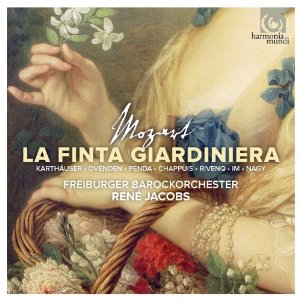This strange opera, from Mozart’s 18th year, is a comedy in which the plot turns on an attempted murder a year before the action begins, in which one character (Count Belfiore) left another (Countess Violante) for dead, and on the insanity—or at least emotional collapse—of one or more characters. After its first performance in Munich (about which Mozart wrote to his father that it was a great success) it received only two more performances; when it was revived during Mozart’s lifetime it was in German translation, as a Singspiel. Then, in 1796, the opera was heard in Prague, somewhat abridged and with “fixed” orchestration—“fixed” in the manner of late Mozart. Some experts believe that Mozart himself did the revising; this current recording, under the ever-curious eyes and ears of René Jacobs, works with that assumption, to great success. (He keeps the new orchestration but restores the cuts.)
The original Munich performance featured 23 instrumentalists; Jacobs uses far more, with flutes, clarinets, bassoons, trumpets, timpani, and an expanded viola section. It makes sense, actually, since the Prague audience had adored Don Giovanni and was accustomed to “that” sound from Mozart. The result is not just more interesting but far less frivolously “young”-sounding and more darkly shaded than the original version (to be heard on a few recordings). If you can, compare any other recording of Arminda’s second-act rage aria, “Vorrei punirti indegno”, to the one on this present recording. While the aria’s greatness and depth of feeling is amazing in any case, the added violas, bassoons, and oboes make it sound like mature Mozart, adding pathos to the anger. In fact, since this is an opera most people, I included, have never found particularly pressing, Jacobs’ performance is a revelation. In addition to coming in at 20 minutes shorter than the proper, intelligent, and very dull Leopold Hager set (Philips), it is vocally acted so vividly that you actually get caught up in the nonsense—and some of it seems less nonsensical than previously.
Also, as is customary with Jacobs, recits are highly realistic and conversational, and are underpinned by commentary from the continuo (somewhat less manic than on his Mozart/da Ponte opera recordings). The cast is excellent. Jeremy Ovenden is the Belfiore; he uses his nice tenor with fluidity and manipulative passion. It is easy to see why Violante, now called Sandrina (the disguised gardener of the title) still loves him, and soprano Sophie Karthäuser portrays her mood swings with ease, and is particularly lovely in her first-act “turtledove” aria. Belfiore is currently wooing Arminda (before he and Sandrina eventually recognize one another, which leads to them both losing their minds simultaneously), here sung ideally by Alex Penda (yes, she’s the same soprano who has been known as Alexandrina Pendatchanska). She is thrilling in her virtuosity, and her display of rage at her betrayal is hair-raising.
Sandrina’s boss, the Podesta (mayor) who is wooing her, is sung by Nicolas Rivenq with just the right combination of menace and buffo personality: his is a character impossible to take seriously. The Cavalier Ramiro, who also seems to be after Arminda, is an unconvincing trouser role, nonetheless well sung by mezzo Marie-Claude Chappuis. Serpetta, the housemaid who oddly enough pines after her boss, the creepy Podesta, is adorably sung by Sunhae Im; Nardo, the other gardener, loves Serpetta and is well-characterized by bass Michael Nagy.
There are many felicitous moments in this work, finest among them sort-of blueprints for the finale of the second act of Figaro, wherein Mozart starts with one character (or a recitative), to which is added a character or two at a time, until all seven soloists are taking part. It’s less complex than that in the later comedy, but wildly entertaining—and yes, he was a mere teenager. The recording under Nikolaus Harnoncourt on Teldec is almost as exciting, but the “fixed” instrumentation adds more than bulk, and overall, Jacobs’ cast is better, making Harnoncourt’s a second choice.
































